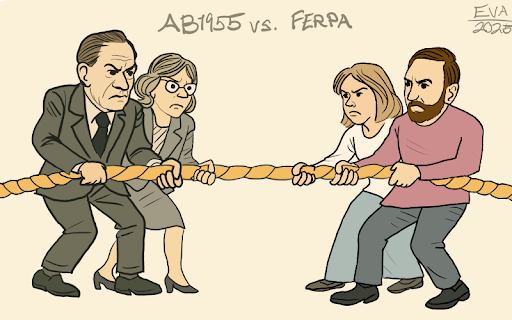It’s no secret that our natural rights as Americans have become a hot button issue in the current political climate.
Among these rights, those enshrined in the First Amendment of our Constitution, are perhaps the ones that have been the subjects of the longest-standing debates. Foremost of these is the freedom of speech, guaranteed to the people of this country, but that right changes slightly when students step onto campus.
Recently at Galt High, there was a small incident that had the senior class buzzing.
During first period in AP English literature class, following a quiz on Mary Shelley’s Frankenstein, a conversation started. The teacher brought up the symbol of lightning blasting a tree trunk as scientific discovery striking society.
The teacher asked students to take part in an anonymous survey as to what they thought the “lightning” was for our modern society. While reading out the responses, the teacher skipped one. After class, some students learned it was because one student’s answer to what was destroying modern society was the LGBTQ community.
One of my classmates is the president of the Galt High Gay Straight Alliance Club. She was pretty upset about the situation. She began to ask if any disciplinary actions had been taken against the student. When she learned the answer was no, she said perhaps there should be some.
This event raises the question of how far is too far when it comes to the expression of a person’s opinions. In California, a school news publication launched a lawsuit after the administration fired the teacher and cut the class after students published a story on sexual harassment. CA student newspaper threatens legal action for alleged retaliation (splc.org)
Students are limited in their freedom of speech on campus, but not as much as they are often led to believe.
The California Education Code is a set of laws governing public schools in California. The two provisions most important to the issue of freedom of speech on school grounds are sections 48907 and 48950.
Section 48907 states, “Pupils of the public schools, including charter schools, shall have the right to exercise freedom of speech and of the press including, but not limited to, the use of bulletin boards, the distribution of printed materials or petitions, the wearing of buttons, badges, and other insignia, and the right of expression in official publications . . .”
This makes it very clear that students have the right to freedom of speech on campus in terms of expression. But the statute contains an exception aimed at preventing dangerous situations. The exception prohibits “material that so incites pupils as to create a clear and present danger of the commission of unlawful acts on school premises… or the substantial disruption of the orderly operation of the school.”
This policy on students’ freedom of expression is echoed in Section 48950, which states that districts of high schools, charter schools, and even some private schools “shall not make or enforce a rule subjecting a high school pupil to disciplinary sanctions solely on the basis of conduct that is speech or other communication.”
Section 48950 also contains provisions designed to protect students against possible danger, and does not stop schools from disciplining students for “harassment, threats, or intimidation unless constitutionally protected.” It also specifies speech rights are subject to “reasonable time, place, and manner regulations.”
Some may argue the statements made by the Galt High student about the LGBTQ community might be subject to punishment on grounds of harassment. However, the student’s speech seems permissible within the context of reasonable time, place and manner regulations.
The other piece that needs to be discussed, though, is the respect for others’ rights. While it is easy to be upset over someone else’s opinion, the notion that someone needs to be disciplined simply for what they think, especially when expressed in response to a question by a teacher, is not only inappropriate – it’s a clear violation of our Constitutional rights.









Karen Thomas • Jan 18, 2024 at 1:23 pm
This is a well-thought-out perspective of a very important, relevant, and sensitive issue facing our society today. Our First Amendment right to freedom of expression is a fundamental principle of our nation, and it should always be protected, disseminated, and utilized.
It is often difficult to accept another’s point of view when it is radically opposite to one’s own principles, beliefs, or moral code, but each citizen has the right to their own set of principles, beliefs, and moral code, and has the right to express them, as we all do.
It seems to me that when someone has expressed an idea that others find offensive or disturbing, critical thinking should be put to use ahead of automatic, knee-jerk reaction. Trying to silence someone points more to the intolerance and prejudice of the silencer, rather than the wrongness of the speaker.
When I find myself uncomfortable with someone’s expression, I reflect inward to discover my own bias or judgement on the subject, because there always is something buried underneath. Prejudice, prevalent and invisible in the era in which I grew up, formed much of the infrastructure of my construct of society. I have had to uncover these rotten bones, parent myself and teach myself more tolerant, inclusive and kind framing, and as i do, my perspective of society shifts which, in turn, alters the vector of my life. If only I had learned this process in high school! I can only imagine how much differently my life would have manifested.
So, kudos to Josh Cullers! You have grasped a fundamental and incredibly important principle upon which our nation was founded, and have unpacked it within the context of current events. Your perspective is whole, healthy, just, and kind. I’m so relieved to see a mind of this caliber among our youth. I’ve had some justifiable fears regarding our country’s future, having seen the lack of interest in our middle schools first hand, and it gives me hope that we will have a future worth seeing in the next few decades. Keep up the good works, and always remember our future is the result of what we do in this moment. We only have this moment….there is no other time than now.